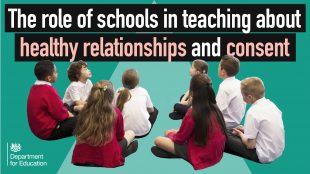
We made relationships education compulsory for all primary and secondary aged pupils for the first time from September of last year. The new relationships, sex, and health education (RSHE) curriculum has been designed to make sure young people learn about respect, consent and privacy. They should understand about why challenging stereotypes is important and learn about healthy relationships from an early age.
The curriculum starts with relationships and health education for primary aged pupils and includes sex education for secondary aged pupils.
The new curriculum was designed after thorough consultation and aims to ensure that we are building a safe society where young people understand what it means to respect others and what healthy relationships are.
We have produced extensive guidance for schools to help them navigate what can be difficult issues and to help them foster respect and healthy communication between pupils.
This is what it means in practice:
What kinds of things are pupils taught about in primary school?
In primary school content within the curriculum is age appropriate. It prepares young pupils to understand the importance of personal space and boundaries and the differences between appropriate and inappropriate or unsafe contact. Pupils should be taught about the concept of privacy and the implications for both children and adults; including that it is not always right to keep secrets if they relate to being safe. They should also learn about what caring relationships and friendships look like and why it is important to show respect to others.
There are many other elements of the curriculum set out in the guidance.
How does it change in secondary school?
At secondary school the curriculum builds on this content. The curriculum covers the characteristics of positive and healthy friendships (in all contexts, including online) including trust, respect, honesty, kindness, generosity, boundaries, privacy, consent and the management of conflict, reconciliation and ending relationships.
Pupils should be taught what constitutes sexual harassment and sexual violence and why these are always unacceptable. They should also understand that some types of behaviour within relationships are criminal including violent behaviour and coercive control.
Pupils will be taught about the concepts of, and laws relating to, sexual consent, sexual exploitation, abuse, grooming, coercion, harassment, rape, domestic abuse, forced marriage, honour-based violence, and female genital mutilation, and how these can affect current and future relationships.
Are you doing anything to make sure that schools themselves are safe places where the things pupils are taught about are shown in reality?
Yes. Our guidance sets out that schools should be alert to issues such as everyday sexism, misogyny, homophobia, and gender stereotypes and take positive action to build a culture where these are not tolerated, and any occurrences are identified and tackled. Staff have an important role to play in modelling positive behaviours.
Schools should also consider what they can do to foster healthy and respectful peer-to-peer communication and behaviour between boys and girls and provide an environment which challenges perceived limits on pupils based on their gender or any other characteristic, including through these subjects and as part of a whole-school approach.
Sexual violence can happen in schools – are you taking action to prevent that?
Schools should refer to the Department’s advice on sexual violence and sexual harassment between children. The advice sets out what sexual violence and sexual harassment are, how to minimise the risk of them occurring and what to do when they do occur or are alleged to have occurred.
Schools should be aware of the importance of making clear that sexual violence and sexual harassment are not acceptable, will never be tolerated and are not an inevitable part of growing up. Any report of sexual violence or sexual harassment should be taken seriously; staff should be aware that statistically it is more likely that women will be the victims of sexual violence and sexual harassment than males, and that it is more likely that it will be perpetrated by men.
Schools have a legal duty to follow the statutory Keeping Children Safe in Education guidance which says all staff should have an awareness of safeguarding issues that can put children at risk of harm.